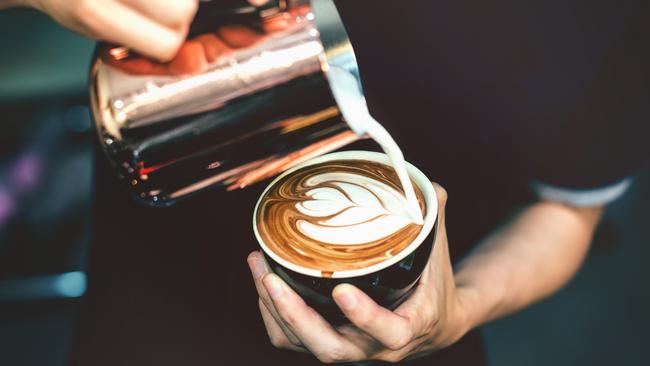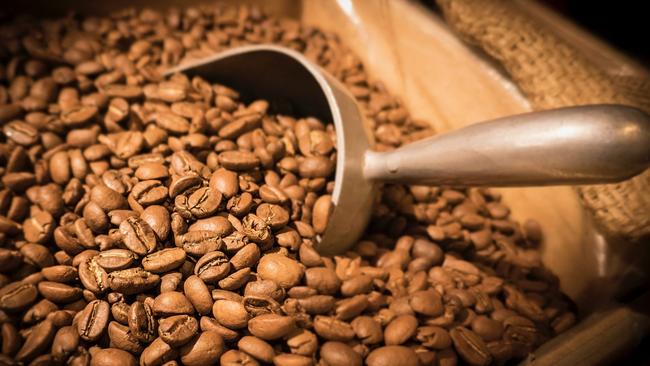How many cups of coffee should you really drink a day?
Cutting out coffee is the latest humblebrag, thanks to a recent global study. Are the coffee abstainers on to something?

Coffee is the great wellbeing divider. There are those of us who can’t get enough of it, who swoon over the mere scent of an espresso and who rate a restaurant, a high street or even a holiday on the quality of its coffee and its ability to see us through energy dips and boredom.
But there are also those for whom cutting out coffee is the latest humblebrag, an increasingly vocal tribe of celebrities and high-flyers keen to proclaim publicly that they don’t go near the black stuff and that their vitality and anxiety levels, their skin, their mental focus have benefited as a result.
Mark Zuckerberg, CEO of Meta, shared on his Threads account that his daily caffeine intake is “none”. Julia Fox, the model and actor, declared in an interview with The Wall Street Journal this year that she is not a coffee drinker. “It just does something to me. It goes right into the core of my brain, and then I’m wired,” Fox said.
Supermodels seem particularly averse to it. “I’ve never drunk coffee - I don’t like the smell,” Naomi Campbell said, while Gisele Bundchen, who says she used to drink a mocha frappuccino every morning, admits that she hasn’t touched coffee in years.


For many it is considered one of a trilogy of demons that has to go. “I don’t drink or smoke or have caffeine,” Jennifer Lopez said. “That really wrecks your skin as you get older.”
As someone who knocks back three espressos before getting dressed for my morning run, I can’t imagine a day without it. Neither, it seems, can millions of others, with a report by the market intelligence agency Mintel predicting that by 2028 the UK could spend more than 2.17 billion pounds on coffee. According to the British Coffee Association (BCA), we drink 98 million cups of it a day and 80 per cent of people who visit coffee shops do so at least once a week. Give us our daily buzz and we are happy.
But even sipping my fourth – or is it my fifth? – cup of the day, I do wonder if the coffee abstainers are on to something. Concerns over the impact of coffee on sleep and mood have resulted in a “caffeine reduction trend” that Mintel says presents a substantial threat to coffee shops and the coffee market. One of its surveys found that two in five consumers want to cut down.
Yet it is findings – such as those from a recent global study carried out by the University of Galway in Ireland, in collaboration with McMaster University, Canada, and an international network of stroke researchers – that might make us put our reusable coffee cups down. Andrew Smyth, professor of clinical epidemiology at the University of Galway and consultant physician at Galway University Hospitals, one of the lead authors of the study, warned that drinking more than four cups of coffee a day increases the risk of stroke, which occurs when blood supply to part of the brain is cut off and brain cells are damaged. His results, published in the International Journal of Stroke, showed that four cups of coffee a day resulted in a 37 per cent higher risk of a stroke. To make swallowing that statistic even more bitter for coffee-lovers, taking three to four cups a day of its arch-rival black tea without milk – including breakfast and Earl Grey teas – was linked with a 29 per cent lower chance of stroke, and green tea with a 27 per cent reduced risk.

It is not the kind of positive news story we have come to expect of coffee. In recent years it has transformed its image from nutritional baddie to a drink with positive health gains. A cup of black coffee provides small amounts of B vitamins and minerals including potassium, manganese and magnesium. In addition, research has identified hundreds of plant components and antioxidants in coffee that are beneficial for gut, brain and overall health.
Scientists from King’s College London and Zoe Nutrition, among other institutions, reported that of about 150 food and drinks tested, coffee had the strongest correlation with the microbiome.
Recently the same team analysed data from more than 22,000 people for a study in Nature Microbiology and found that some beneficial microbes, such as L. asaccharolyticus, were six to eight times more prevalent in the guts of coffee drinkers. Since L. asaccharolyticus increases levels of hippurate, a marker of metabolic health, the researchers proposed that high levels of the beneficial bacterium could be one reason for coffee’s health benefits.
Some studies, including one in the European Journal of Preventive Cardiology, have linked coffee consumption to a lower risk of cardiovascular disease and a longer life span, while others have linked coffee to performance boosting and fat-burning.

With many of these studies there is a caveat: coffee should be consumed in moderation. Up to three standard-sized cups (each 250ml) of coffee a day had no negative health effects on stroke risk in Smyth’s investigation, and countless others have reached a similar conclusion. Two to three cups a day has been associated with lowering body fat in women, and with reducing heart disease risk and increasing longevity, as well as with boosting mood and mental health.
“You can enjoy coffee – and I drink some myself – but the overwhelming evidence suggests up to three cups a day is optimal,” Smyth says. “If you drink more than that out of habit, it’s probably worth reducing it.”
Caffeine, high intakes of which can cause the jitters and anxiety in some people, is often blamed as the devil component in coffee. It is known to increase secretion of the stress hormone cortisol, which in turn can prompt your blood pressure to rise and your heart to beat faster.
But when it comes to stroke and some other risks, it is “likely that the harmful effects are not down to the caffeine in coffee alone”. Certainly, caffeine can raise your heart rate and alter how constricted or dilated your blood vessels are, which affects blood flow around the body and to the brain.
“Too much of it can trigger irregular heartbeat in susceptible people, a risk factor for strokes, and it is implicated in raising blood pressure,” Smyth says. “But tea contains caffeine too, and we didn’t see the same adverse effects for stroke, which suggests other factors are at play with coffee.”
Not all coffee is equal. The BCA says that while ground coffee and single-use coffee pods are becoming increasingly popular, 80 per cent of UK households still buy jars of spray-dried or freeze-dried instant coffee to drink at home.

“Coffee beans contain antioxidants and other substances that have been shown to reduce inflammation and play a part in lowering the risk of cardiovascular disease, but a lot of the biological benefits come down to how the raw bean is handled and roasted,” Smyth says. “I would think of coffee in the same way as other foods, in that it can be beneficial in its most natural state if used from bean to cup, but which is often so highly processed by the time you drink it that any health gains are limited.”
How you prepare coffee also influences its effects.
“A plain black coffee or an espresso is very different to some of the complex coffee orders in some chains,” Smyth says. “Any additions to a plain cup of coffee in terms of sweeteners, syrups, flavourings and cream can potentially undo benefits of the plant compounds the bean contains.”

Even adding milk can reduce or block the health-enhancing effects of antioxidants. In his study, Smyth showed that the reduced stroke risk from tea-drinking was lost for those who added milk to the beverage.
“Ingredients, including milk, can bind to some of the antioxidants in coffee to limit their benefits,” he says. “And sugary additions are not good for health or waistline.”
Even if you are a hardened java addict like me, symptoms such as palpitations, headaches, sluggishness – yes, too much coffee can make you feel tired – and anything beyond a beneficial buzz are signs that you are probably drinking too much. Smyth says that my exercise habits and reasonably healthy diet will not override the negative effects of my coffee habit. I need to cut down.
“When we did our analysis, we included other risk factors such as smoking, diet and exercise, hypertension and other issues,” Smyth says. “It means that too much coffee in itself is problematic for some people and we should try to stick to no more than two to three cups a day.”
CUP BY CUP: A GUIDE
ONE CUP
Drinking one cup of coffee can provide a mental boost, with several studies showing that the caffeine it contains boosts performance in cognitive tests 30 to 45 minutes later.
“Coffee stimulates your digestive system as well as making you mentally alert,” says the nutritionist Rhiannon Lambert, author of The Science of Nutrition. “Many people find they have a bowel movement soon after drinking one cup of coffee.”
At the University of Bath, Professor James Betts, co-director of the Centre for Nutrition, Exercise and Metabolism, says drinking a cup of black coffee as soon as we wake up interferes with blood glucose control. “Our blood sugar control is impaired when the first thing our bodies come into contact with is coffee after a night of disrupted sleep,” he said. “We might improve this by eating first and then drinking coffee later.”
TWO CUPS
But even if two cups is your upper limit, you should be careful when you drink, ideally avoiding coffee for at least two hours before bed.

“Coffee’s stimulating effects peak anything between 30 and 75 minutes after drinking it,” says the caffeine researcher Neil Clarke, associate professor of sport and exercise science at Birmingham City University. “We each respond differently to caffeine’s effects and the important thing is to understand how it works for you as you do not want to be alert when attempting to sleep.”
The NHS advises pregnant women to limit their daily caffeine intake to 200mg – about two standard cups – because excessive amounts are linked to miscarriage.
THREE CUPS
Three cups a day was within the healthy limit in Smyth’s study and was not associated with a raised stroke risk. Similarly, researchers at Queen Mary University of London reported that those drinking up to three cups of coffee a day were 25 per cent less likely to die of any cause during the 11-year study – but it must be freshly brewed, not instant. However, for some people, even this is too much. If you suffer from hypertension, three cups of coffee a day could be risky. A study of more than 18,600 men and women with raised blood pressure found those drinking two or more cups a day were at twice the risk of death from cardiovascular disease compared with non-coffee drinkers.
FOUR CUPS
Individual tolerance to caffeine varies but the European Food Safety Authority says that a safe daily intake for most people is no more than 400mg of caffeine – about four regular cups of coffee – for healthy individuals.

“Crossing over into four or more standard-sized 250ml cups of coffee was where stroke risk began to rise in our study,” Smyth says.
In a study of 26,318 middle-aged women published in Clinical Nutrition, food scientists at the University of Leeds found that every additional cup of tea or coffee (from zero cups a day) was associated with a 4 per cent reduction in the risk of a hip fracture, although Jill Griffin, head of clinical engagement at the Royal Osteoporosis Society, says three to four cups a day is a healthy upper limit for bone health.
FIVE CUPS
A BMJ paper suggested the lowest risk of disease is associated with drinking three to five cups of coffee a day, but more than five cups “may reduce or reverse the potential benefit”. Remember, too, that coffee can stain your teeth.
“Coffee is full of chromogens containing dark pigments that cling to tooth enamel,” says Dr Alexis Aillett in her book Drinkology. “These can stain your teeth even with the addition of milk in your coffee.”
If you drink this much coffee (or more), then you will probably experience some withdrawal symptoms if you suddenly stop or cut down.
“Headaches, grogginess, irritability are all symptoms of caffeine withdrawal,” Clarke says. “Most people who drink five cups a day will experience some symptoms if they don’t get their fix.”
SIX CUPS OR MORE
This is where the risks for some people can start to ramp up. A 2019 study at the University of South Australia involving 347,077 British participants aged 37 to 73 warned that six or more coffees a day can be detrimental to health. That amount was enough to cause high blood pressure, a precursor to heart disease, potentially increasing the risk of heart disease by up to 22 per cent.

“In order to maintain a healthy heart and a healthy blood pressure, people must limit their coffees to fewer than six cups a day – based on our data, six was the tipping point where caffeine started to negatively affect cardiovascular risk,” the Australian team said.
Too much caffeine increases the amount of calcium lost in urine which in theory could lead to a loss of bone strength and a greater susceptibility to osteoporosis. According to the Royal Osteoporosis Society, tea contains specific biologically active plant compounds, or polyphenols, which seem to counter the negative effects of caffeine on bones.

To join the conversation, please log in. Don't have an account? Register
Join the conversation, you are commenting as Logout